Fast Facts
- When: 11th February 2024
- Where: Allegiant Stadium, Paradise, Nevada
- Watch: Live on ITV & Sky Sports
- Official Website: Official NFL Website
The Super Bowl is widely thought of as one of the biggest sporting occasions in the world, watched by around 100 million people in the US alone.
The game is the season finale to the National Football League (NFL) regular season and play-off games, making it the most prestigious honour in American Football. The game pits the winner of the American Football Conference (AFC) against the winner of the National Football Conference (NFC).
American Football has become more popular in the UK in recent years, especially since a small number of regular season NFL games are played right here in Blighty. But it is still the Super Bowl that gets the most attention from both viewers and the bookies.
Existing Customer Free Bets & Money Back Offers
Please Note: This event has now ended.
Stats Articles
- Super Bowl Streakers - How Often is there a Streaker at the Super Bowl?
- Undefeated NFL Teams - Which American Football Teams Have Had a Perfect Season?
- What Are the Average Points Per Game in the Super Bowl?
- What Are the Average Points Per Game in the NFL?
- What Are the Highest & Lowest Scoring Super Bowls?
- Which NFL Teams Have Won Back-to-Back Super Bowls?
- Which NFL Team Has Won The Most Super Bowls?
- Which NFL Conference Has the Best Super Bowl Record?
Schedule
- Pre-Season – Friday 11th to Sunday 27th August 2023
- Regular Season – Thursday 7th September 2023 to Sunday 7th January 2024
- Wild Card Matches – Saturday 13th to Monday 15th January 2024
- Divisional Playoffs – Saturday 20th & Sunday 21st January 2024
- Conference Championships – Sunday 28th January 2024
- Pro Bowl – Sunday 4th February 2024
- Super Bowl – Sunday 11th February 2024
This schedule is subject to change.
About The Super Bowl
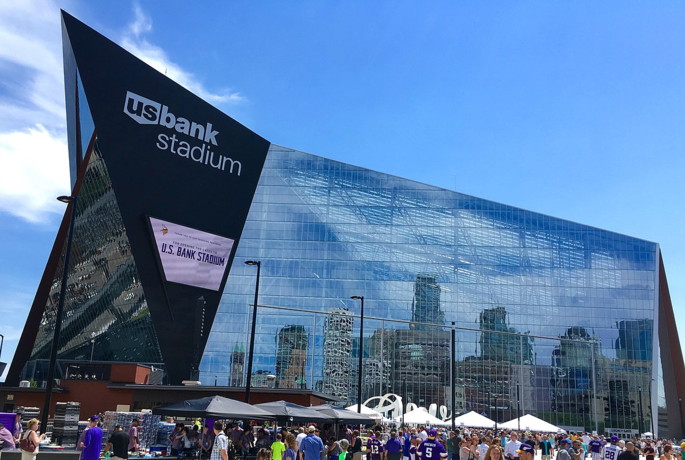
The Super Bowl doesn’t have a ‘home’ as such and takes places each year at a different venue. All teams from within the NFL can tender a bid to host the Super Bowl and stadiums are picked depending on a number of factors, including a minimum 70,000 seater stadium, the ability to host a massive influx of people within the surrounding area and the ability to handle the massive pre-game shows that take place throughout the state or city.
Why is it Called the Super Bowl?
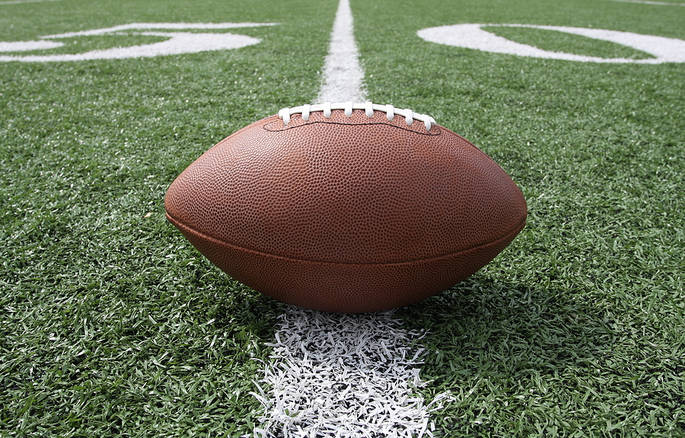
In college football, the term ‘bowl’ is used to describe an off-season game between two sides. The first ‘bowl’ of note was the Rose Bowl Game that took place for the first time in 1902 in Pasadena, California. It was part of the Pasadena Tournament of Roses, hence the ‘Rose’ part of its name, and the ‘bowl’ part likely came from the shape of the stadium it was played in.
This post-season match was so popular that imitations began to spring up around the country, including the Orange Bowl in Miami and the Sugar Bowl in New Orleans. As a result, the notion of a big game being referred to as a ‘Bowl Game’ was common in American football by the time the NFL was being formed.
It was actually the owner of the Kansas City Chiefs who first referred to the game as a ‘Super Bowl’, doing so in an off-the-cuff manner during merger meetings in spite of the fact that the leagues’ owners chose the more official title of the AFL–NFL Championship Game.
In July of 1966 the Kansas City Star newspaper discovered that Lamar Hunt has called it the Super Bowl, with the rest of the media jumping on board the use of it as a term to describe the new game taking place at the end of each regular season. The leagues still felt that this wasn’t a great name and asked for alternatives, considering the likes of ‘the Merger Bowl’ and ‘The Game’. They didn’t get their wish, with the term ‘Super Bowl’ sticking for the public and Roman numerals being added to the title from 1971 onwards.
The History of the NFL
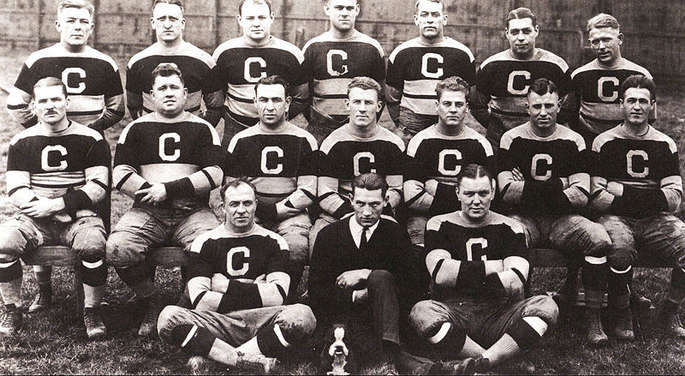
The Super Bowl is a fascinating game in that it came not out of a desire to find the champion of a league but rather out of a merger between two different leagues. From the moment that the National Football League was founded in 1920, numerous rival leagues were formed to offer Americans an alternative to watch.
All of these came and went without causing the NFL any problems, but in 1960 the American Football League was formed and presented the NFL with a genuine challenge. Both players and supporters were caught up in deciding between the two leagues, meaning that by the middle of the 1960s the leaders of the two divisions set down to discuss the possibility of a merger.
The NFL & AFL Merger
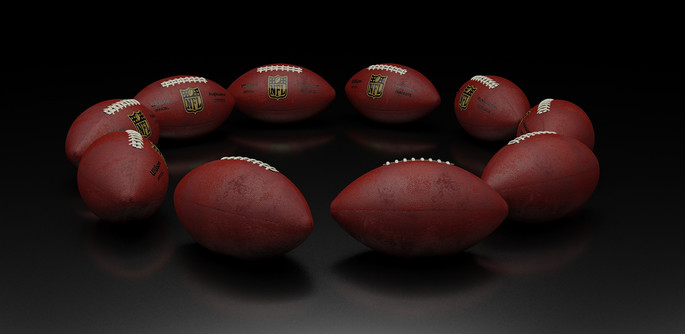
Given that both leagues wanted success for the game of American football, it didn’t take long for an agreement to be reached that would come into effect for the 1970 season onwards. The agreement was made in 1966 and part of the merger saw a decision made to see the champions of the AFL and the champions of the NFL go head-to-head every year until the merger came into play.
Initially it was feared that the merger wouldn’t even last until 1970 when the Green Bay Packers won the first two championship games, leading many to speculate that the AFL simply couldn’t compete with the competitiveness of the NFL. When the event took place for the third time in Miami, however, the New York Jets of the AFL beat the NFL’s Baltimore Colts, with that victory being followed the next year by the Kansas City Chiefs beating the Minnesota Vikings to give the AFL two winners in a row.
The merger between the NFL and the AFL took place ahead of the 1970 season, with the outcome being that they formed one league with two conferences. There were numerous other agreements in place, such as the decision to keep all existing franchises and to not allow new franchises to be created where existing ones already were.
Perhaps the change that would have the biggest effect on the sport moving forward came in the form of a ‘draft system’ being introduced in order to stop teams bidding to attract the top players from the best college football teams.
The new league would keep the name of the National Football League, with the American Football League’s history being incorporated into it even whilst the name and logo was retired. Three NFL teams joined the ten teams of the AFL to create the American Football Conference, whilst the thirteen NFL sides made up the National Football Conference. Though there were now two conferences, they were on a par with each other and so the winner of the AFC and the winner of the NFC would go up against each other in the Super Bowl at the end of each regular season.
Shifting Dominance
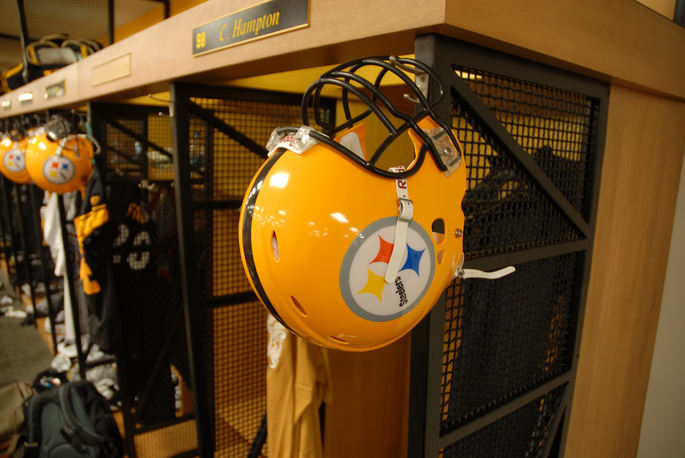
As you’d expect from a major game that has been taking place for several decades, the Super Bowl has never been dominated by just one team. Instead, the biggest match in the American football calendar has seen a series of shifts take place over the years. That’s not to say there haven’t been periods of dominance, however. In the 1970s the Dallas Cowboys (2), Miami Dolphins (2) and Pittsburgh Steelers (3) would win seven of the ten titles between them.
As a sign of just how much the series was in a constant state of flux, though, it’s worth noting that the Cowboys lost Super Bowl V to the Baltimore Colts. The game is noteworthy on account of the fact that a player from the losing team, Chuck Howley, was awarded the MVP – the only time in Super Bowl history that has happened.
In 1980 the Pittsburgh Steelers became the first team to win four Super Bowls, doing so in six years. Even today they remain the only franchise to have won back-to-back Super Bowls on two occasions; something that they achieved when they won Super Bowls IX and X and then XII and XIV.
It wasn’t enough to stop the NFC dominating the Super Bowl in terms of conferences, with sixteen of the twenty Super Bowls of the 1980’s and 1990’s being won by teams from the National Football Conference. Between Super Bowl XIX and Super Bowl XXXI, NFC teams won thirteen straight championships. The San Francisco 49ers were the best team of the 1980s, winning the Super Bowl four times, whilst the Dallas Cowboys returned to prominence in the 1990s.
The Modern Era
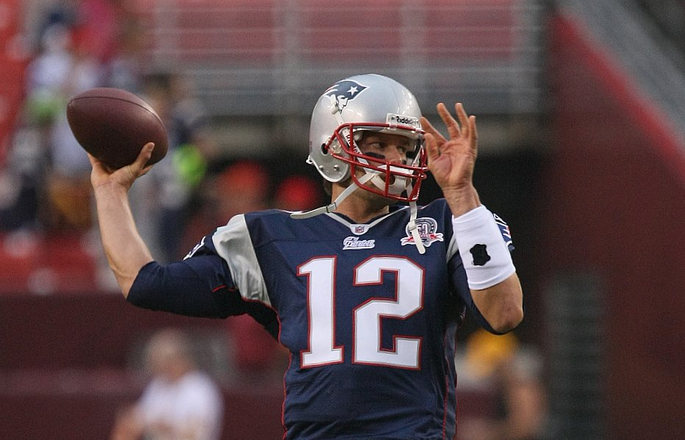
As is often the case with sporting achievement, the end of the 1990s into the new millennium saw a swing of fortunes for NFL teams, with the AFC returning to winning ways.
The Denver Broncos got things started at Super Bowl XXXII when they beat the Green Bay Packers to end the thirteen-year winning streak of NFC teams. The Broncos defended their title the following year and ushered in an era of AFC teams being victorious, winning nine of the next twelve Super Bowls.
This was partly thanks to the brilliance of the Pittsburgh Steelers, the New England Patriots, the Broncos, the Baltimore Ravens and the Indianapolis Colts, who between them represented the AFC in twenty of the twenty-two Super Bowl appearances from the conference between 1995 and 2016.
It was the Patriots in particular who were seen as the team to beat in the 2000s, winning the Super Bowl on three out of four occasions at the start of the century. Only the Tampa Bay Buccaneers were able to break up their dominance, beating the Oakland Raiders 48-21 at Super Bowl XXXVII. In recent years the honours have been split fairly evenly between the NFC and the AFC, seeing some truly special matches in the process.
At Super Bowl LI, for example, the Atlanta Falcons were leading 28-3 as the third quarter was coming to an end, only for the Patriots to storm back and win 34-28 in overtime – the first time the Super Bowl had needed an overtime period to find a winner. The turn of the millennium also saw the same players dominating, with one of Tom Brady, Ben Roethlisberger, or Peyton Manning featuring as a quarterback in all but three Super Bowls from 2002 to 2021.
Since 2020 we have seen a new era of dominance from the Kansas City Chiefs and their star quarterback Patrick Mahomes. The Chiefs reached four Super Bowls out of five between 2000 and 2024, winning on three occasions. Their only Super Bowl loss in this time was in 2021 to the Tampa Bay Buccaneers who were inspired by their MVP quarterback, Tom Brady.
NFL Season Format
The regular season in American football sees thirty-two teams split up into two conferences with sixteen teams in each. The conferences are then broken down further into four divisions each, based on their geographical location.
NFC Teams and Divisions
| East | West | North | South |
|---|---|---|---|
| Dallas Cowboys | Arizona Cardinals | Chicago Bears | Atlanta Falcons |
| New York Giants | Los Angeles Rams | Detroit Lions | Carolina Panthers |
| Philadelphia Eagles | San Francisco 49ers | Green Bay Packers | New Orleans Saints |
| Washington Commanders | Seattle Seahawks | Minnesota Vikings | Tampa Bay Buccaneers |
AFC Teams and Divisions
| East | West | North | South |
|---|---|---|---|
| Buffalo Bills | Denver Broncos | Baltimore Ravens | Houston Texans |
| Miami Dolphins | Kansas City Chiefs | Cincinnati Bengals | Indianapolis Colts |
| New England Patriots | Las Vegas Raiders | Cleveland Browns | Jacksonville Jaguars |
| New York Jets | Los Angeles Chargers | Pittsburgh Steelers | Tennessee Titans |
Each of these divisions’ teams then plays sixteen games each according to a pre-determined schedule. At the end of this regular season the winners of the four divisions of each conference as well as two Wild Card teams, as decided by the sides with the best overall records that didn’t win their divisions, progress to a play-off tournament. The two best teams from each conference then play each other in order to determine who will progress to the Super Bowl.
NFL Conference Championships – 2000 to 2024
| AFC | NFC | |||||
|---|---|---|---|---|---|---|
| Year | Winner | Score | Runner-Up | Winner | Score | Runner-Up |
| 2024 | Chiefs | 17 – 10 | Ravens | 49ers | 34 – 31 | Lions |
| 2023 | Chiefs | 23 – 20 | Bengals | Eagles | 31 – 7 | 49ers |
| 2022 | Bengals | 27 – 24 (OT) | Chiefs | Rams | 20 – 17 | 49ers |
| 2021 | Chiefs | 38 – 24 | Bills | Buccaneers | 31 – 26 | Packers |
| 2020 | Chiefs | 35 – 24 | Titans | 49ers | 37 – 20 | Packers |
| 2019 | Patriots | 37 – 31 (OT) | Chiefs | Rams | 26 – 23 (OT) | Saints |
| 2018 | Patriots | 24 – 20 | Jaguars | Eagles | 38 – 7 | Vikings |
| 2017 | Patriots | 36 – 17 | Steelers | Falcons | 44 – 21 | Packers |
| 2016 | Broncos | 20 – 18 | Patriots | Panthers | 49 – 15 | Cardinals |
| 2015 | Patriots | 45 – 7 | Colts | Seahawks | 28 – 22 (OT) | Packers |
| 2014 | Broncos | 26 – 16 | Patriots | Seahawks | 23 – 17 | 49ers |
| 2013 | Ravens | 28 – 13 | Patriots | 49ers | 28 – 24 | Falcons |
| 2012 | Patriots | 23 – 20 (OT) | Ravens | Giants | 20 – 17 | 49ers |
| 2011 | Steelers | 24 – 19 | Jets | Packers | 21 – 14 | Bears |
| 2010 | Colts | 30 – 17 | Jets | Saints | 31 – 28 (OT) | Vikings |
| 2009 | Steelers | 23 – 14 | Ravens | Cardinals | 32-25 | Eagles |
| 2008 | Patriots | 21 – 12 | Chargers | Giants | 23 – 20 (OT) | Packers |
| 2007 | Colts | 38 – 34 | Patriots | Bears | 39 – 14 | Saints |
| 2006 | Steelers | 34 – 17 | Broncos | Seahawks | 34 – 14 | Panthers |
| 2005 | Patriots | 41 – 27 | Steelers | Eagles | 27 – 10 | Falcons |
| 2004 | Patriots | 24 – 14 | Colts | Panthers | 14 – 3 | Eagles |
| 2003 | Raiders | 41 – 24 | Titans | Buccaneers | 27 – 10 | Eagles |
| 2002 | Patriots | 24 – 17 | Steelers | Rams | 29 – 24 | Eagles |
| 2001 | Ravens | 16 – 3 | Raiders | Giants | 41 – 0 | Vikings |
| 2000 | Titans | 33 – 14 | Jaguars | Rams | 11 – 6 | Buccaneers |
The Super Bowl, as explained before, sees the winner of the National Football Conference play-off go up against the winner of the American Football Conference play-off. This match up of conference champions is the biggest game in American sport, with the winner being declared the Super Bowl Champion.
Super Bowl Teams & Scores – 2000 to 2024
| Year | Number | Winner | Runner-Up | Score | Winner’s Division |
|---|---|---|---|---|---|
| 2024 | LVIII | Kansas City Chiefs | San Francisco 49ers | 25-22 (OT) | AFC West |
| 2023 | LVII | Kansas City Chiefs | Philadelphia Eagles | 38-35 | AFC West |
| 2022 | LVI | Los Angeles Rams | Cincinnati Bengals | 23-20 | NFC West |
| 2021 | LV | Tampa Bay Buccaneers | Kansas City Chiefs | 31-9 | NFC South |
| 2020 | LIV | Kansas City Chiefs | San Francisco 49ers | 31-20 | AFC West |
| 2019 | LIII | New England Patriots | Los Angeles Rams | 13-3 | AFC East |
| 2018 | LII | Philadelphia Eagles | New England Patriots | 41-33 | NFC East |
| 2017 | LI | New England Patriots | Atlanta Falcons | 34-28 (OT) | AFC East |
| 2016 | 50 | Denver Broncos | Carolina Panthers | 24-10 | AFC West |
| 2015 | XLIX | New England Patriots | Seattle Seahawks | 28-24 | AFC East |
| 2014 | XLVIII | Seattle Seahawks | Denver Broncos | 43-8 | NFC West |
| 2013 | XLVII | Baltimore Ravens | San Francisco 49ers | 34-31 | AFC North |
| 2012 | XLVI | New York Giants | New England Patriots | 21-17 | NFC East |
| 2011 | XLV | Green Bay Packers | Pittsburgh Steelers | 31-25 | NFC North |
| 2010 | XLIV | New Orleans Saints | Indianapolis Colts | 31-17 | NFC South |
| 2009 | XLIII | Pittsburgh Steelers | Arizona Cardinals | 27-23 | AFC North |
| 2008 | XLII | New York Giants | New England Patriots | 17-14 | NFC East |
| 2007 | XLI | Indianapolis Colts | Chicago Bears | 29-17 | AFC South |
| 2006 | XL | Pittsburgh Steelers | Seattle Seahawks | 21-10 | AFC North |
| 2005 | XXXIX | New England Patriots | Philadelphia Eagles | 24-21 | AFC East |
| 2004 | XXXVIII | New England Patriots | Carolina Panthers | 32-29 | AFC East |
| 2003 | XXXVII | Tampa Bay Buccaneers | Oakland Raiders | 48-21 | NFC South |
| 2002 | XXXVI | New England Patriots | St Louis Rams | 20-17 | AFC East |
| 2001 | XXXV | Baltimore Ravens | New York Giants | 34-7 | AFC Central |
| 2000 | XXXIV | St. Louis Rams | Tennessee Titans | 23-16 | NFC West |
The Vince Lombardi Trophy
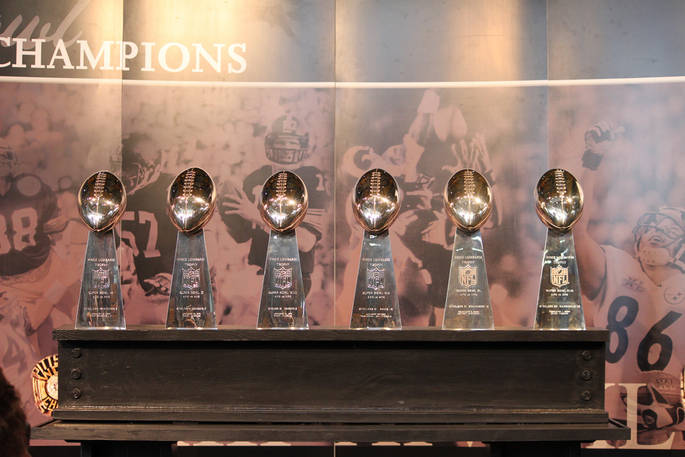
As well as playing for the right to be declared the national champion, the two teams competing in the Super Bowl will be hoping to lift the Vince Lombardi Trophy. Named after the man who led the Green Bay Packers to back-to-back victories in the first two Super Bowls, the trophy was designed by Oscar Riedner of Tiffany & Co.
The trophy is inscribed with the words ‘World Professional Football Championship’, leading to some people declaring the team that lifts it to be ‘World Champions’, in spite of the fact that only American teams can compete for it.
It received its current title in 1970 when Vince Lombardi died from cancer. It is typically presented to the owner of the winning team on the field after the conclusion of the game, having been given to the winning side in their dressing room prior to Super Bowl XXX. The winning team gets to keep the trophy each time they win it, with a new Vince Lombardi Trophy being made every year.
The trophy stands at twenty-two inches in height and weighs seven pounds. It has a football on top of a side stand and is made entirely out of sterling silver. Before the winning team gets to take it home Tiffany’s inscribe it with the teams that took part, the location, date and final score.
Interesting facts
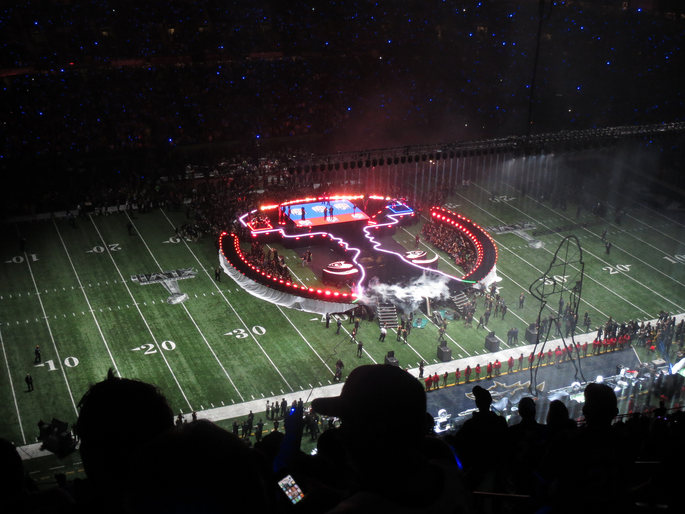
The Super Bowl is viewed around the world by an estimated one hundred and fifty million people, making it one of the most watched sporting events of the year.
One of the things that the event is synonymous with is its advertising, with companies paying upwards of $5 million for just thirty seconds of ad time within the game. Whilst advertisements are typically rather boring, often companies will try and make their ads as memorable as possible, due to the staggering number of people watching the Super Bowl, resulting in them being an integral part of the half-time show. Once such example came in 1984 when Apple created what is considered to be one of the greatest Super Bowl adverts ever when the company launched the Macintosh.
The half-time show is one of the most iconic features of the event. In the early days marching bands from one of the local colleges often filled the slot, but now it attracts some of the biggest names in the music industry, including the likes of Rihanna, Justin Timberlake, Beyoncé, The Who, Paul McCartney and the Rolling Stones.
The game in 2016 was the fiftieth anniversary of the Super Bowl and was the first year that Roman numerals were not used to represent the number. So, whilst the forty-ninth Super Bowl in 2015 was known as Super Bowl XLIX, 2016 was simply called Super Bowl 50. It returned to using Roman numerals for the 2017 tournament.
The New England Patriots and the Pittsburgh Steelers are the most successful teams in Super Bowl history, winning a six titles each so far. They are closely followed by the Dallas Cowboys and the San Francisco 49ers who have 5 Super Bowl wins each. Tom Brady is the most decorated player winning no fewer than seven Super Bowl Rings, surpassing Charles Hayley’s five.
Due to the potentially massive revenue that can be made from television rights, the Super Bowl committee saw fit to alternate between different networks each year. Fox, CBS and NBC all rotate the viewing rights from year to year. Here are some other interesting facts:
- At the time of writing, four teams have yet to play in a single Super Bowl. These are the Cleveland Browns, the Detroit Lions, the Jacksonville Jaguars and the Houston Texans
- Given that the Jaguars, Texans and Lions have all hosted the Super Bowl, Cleveland is the only city in the States with a representative team that has neither hosted nor seen its team reach the Super Bowl
- In 2021, the Tampa Bay Buccaneers became the first team to play a Super Bowl in their home stadium
- The Minnesota Vikings and Buffalo Bills share the title of being the least fortunate teams, having reached four finals apiece to date without winning
- The Dallas Cowboys versus the Pittsburgh Steelers is the most common fixture, having occurred in three Super Bowls so far
- Glenn Parker, Cornelius Bennett and Gale Gilbert have been on the losing team five times apiece at the Super Bowl
- Ken Norton Jr. has won the most consecutive championships as a player, winning Super Bowl XXVII and XXVIII with the Dallas Cowboys before switching teams and winning Super Bowl XXIX with the San Francisco 49ers
- Bill Belichick boasts the most Super Bowl appearances as either a coach or a player with twelve
- Tom Brady holds the record for being the oldest player, aged 43 years and 199 days as Quarterback for the Tampa Bay Buccaneers at Super Bowl LV. Next oldest is Matt Stover, aged 42 years and 11 days when he was a kicker for the Indianapolis Colts at Super Bowl XLIV
- The youngest Super Bowl starter thus far was Bryan Bulaga, who was 21 years and 322 days old when he was the Green Bay Packers’ offensive lineman at Super Bowl XLV
- Jerry Rice has scored more Super Bowl points than any other player, racking up forty-eight of them across three Super Bowls for the San Francisco 49ers and one for the Oakland Raiders
